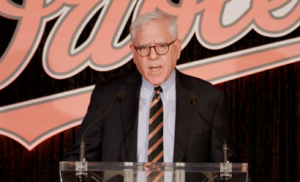
Corbin Burnes’ departure provoked angry comments from disappointed fans who thought he might return to anchor the Orioles’ starting rotation in 2025 and beyond.
Some fans blamed new owner David Rubenstein, saying he was like his predecessor, John Angelos, and that the Orioles would not remain competitive in the American League East because they wouldn’t spend the money necessary to keep pace.
Rubenstein is many things, but he’s much different than Angelos. He’s much more comfortable in public, posing for selfies and tossing hats to fans, and continues to have a higher media profile, though he doesn’t often discuss the Orioles.
He’s said he’s enjoyed the experience and, in an interview in October on National Public Radio, said he recognized he wanted more than that. “Without winning a World Series or a championship, it won’t be satisfying. So I’m trying to do everything I can with my partners to make sure that the team has everything it needs to win a championship,” he said.
It appears that he’s doing that. According to MLBTradeRumors.com, the Orioles have spent the eighth-most money in baseball on free agents.
So far, the Orioles have guaranteed $71 million to outfielder Tyler O’Neill (three years, $49.5 million with an opt-out after 2025), 35-year-old Japanes right-handed starter Tomoyuki Sugano (one year, $13 million), and catcher Gary Sánchez (one year, $8.5 million).
That isn’t close to the $917.25 million the New York Mets have doled out to eight free agents, including the $765 million to outfielder Juan Soto, or the more than $200 million the Dodgers and Yankees have spent. And then there’s the $210 million the Arizona Diamondbacks are spending on Burnes over the next six years, though some of that money is deferred and he has an opt-out after 2026.
But it’s a lot more money than they’ve spent in the first five offseasons since Mike Elias took over baseball operations in November 2018.
Before the 2024 season, the Orioles had the 28th-highest payroll in baseball. According to Cot’s Contracts, the Orioles currently have the 18th-highest estimated payroll in baseball, $129.8 million, a rise of more than $25 million since the end of the 2024 season.
There’s still plenty of time to add players by free agency or trades, and the Orioles’ payroll could rise, but it won’t ever be in the top handful in the game.
During the last decade when the team was in the postseason three times in five seasons, the payroll was in the upper half of the majors but was never among the big spenders.
Fans who aren’t critical of Rubenstein cite a report that the new owner has given Elias the go-ahead to spend, but he’s refused.
Since the payroll has already risen under Rubenstein’s ownership, it seems silly to claim that Elias, who has continually credited the new owner and his partners with providing the necessary financial support, won’t spend because he already has.
2025 and 2026 are important seasons for the Orioles. Their more experienced homegrown players — catcher Adley Rutschman, shortstop Gunnar Henderson, infielder Jordan Westburg and starting pitcher Grayson Rodriguez — will be under club control. Their younger prospects — outfielders Colton Cowser and Heston Kjerstad and second baseman Jackson Holliday — should be improving.
Since Elias has been reluctant to draft pitchers with the Orioles’ top picks, they’ve been forced to rely on trades, free agents and lower-tiered draft choices. Of the Orioles’ projected 2025 starters, Elias inherited Rodriguez and Dean Kremer from the previous regime, acquired Zach Eflin and Cade Povich in trades and signed Sugano as a free agent.
More is needed, and Elias has six weeks before spring training begins to add to the rotation.
BetOnline.ag still has the Orioles’ projected win total at 88 ½, a reduction of a game since Burnes signed with Arizona, but the second highest in the American League to the Yankees.
Elias has his share of detractors in baseball, but according to a survey by The Athletic, the Orioles’ front office ranked 16th among the 124 teams in the four major sports — MLB, NFL, NBA, NHL.
In baseball, the Orioles were fifth behind the Dodgers, Tampa Bay Rays, Atlanta Braves and Cleveland Guardians.
The Ravens’ front office was ranked first in the NFL and second overall behind only the NBA’s Oklahoma City Thunder.
Rubenstein has allowed Elias to pursue free agents while acknowledging that Baltimore isn’t New York or Los Angeles. He has owned the team for less than a year, and the Orioles aren’t the only business he controls. He remains co-founder and co-chairman of the Carlyle Group, a mammoth private equity firm.
Rubenstein also remains the Board Chair of the Kennedy Center until September 2026. He said he planned to step down in 2025 shortly before the sale of the Orioles was announced last January.
He also is a noted historian and last Sunday was on CBS’ “Face the Nation” to discuss his new book, “The Highest Calling” on the presidency.
Rubenstein hired Catie Griggs from the Seattle Mariners to run the Orioles’ business operations and attended many games last season.
After back-to-back postseasons in which the Orioles were swept out of the playoffs, Rubenstein wants more in 2025.
Call for questions: I answer Orioles questions most weekdays. Please send yours to: Rich@BaltimoreBaseball.com.